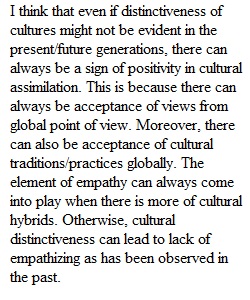


Q Cultural identities are apparently still important, although they have also become more complex. Globalization has indeed made many of us cultural hybrids, but it seems doubtful that it would erase the distinctiveness of cultures -- in part because of resistance to the perceived global dominance of certain cultures and the scars of history. Besides, the intersection of cultures has produced different kinds of hybrids, depending on the cultures involved. So, a black Indian is likely to be different (in his/her intercultural experiences and maybe consciousness) than a Mexican American -- as the documentary, Black Indians, and Cisneros's House on Mango Street suggest. It seems that as cultural intersections further our awareness of our common humanity (and create greater multicultural understanding), cultures are also being transformed -- relatively. “Hybridity” (or “mestizo consciousness” in Anzaldua’s Borderland/La Frontera) is more a conjunctive process than its final consequence. The intersection of cultures does not always result in the obliteration of the distinctiveness of cultures but the expansion (or contraction) of cultural-ideological semiotic systems. Cultures are semiotic systems and, as Gilles Deleuze and Félix Guattari point out, they “depend on assemblages, and it is the assemblages that determine that a given people, period, or language, and even a given style, fashion, pathology, or minuscule event in a limited situation, can assure the predominance of one semiotic or another.”
View Related Questions